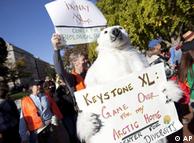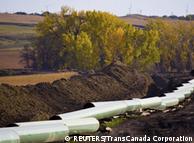UNITED STATES | 19.01.2012
Obama rejects major Keystone pipeline scheme
US President Barack Obama on Wednesday rejected plans for a major oil pipeline from Canada to Texas, a move criticized by Republicans as pandering to environmentalist voters before the November presidential election.
In his ruling, Obama said there was not enough time to fairly review environment and public safety aspects of the Keystone XL pipeline project before a February deadline forced on him by Republicans as part of an unrelated tax deal.
"This announcement is not a judgment on the merits of the pipeline, but the arbitrary nature of a deadline that prevented the State Department from gathering the information necessary to approve the project and protect the American people," said Obama in a written statement. "I'm disappointed that Republicans in Congress forced this decision."
His decision did not kill the project, but could delay a further decision until after the election. The White House has said the president could still review an alternative route that would avoid environmentally sensitive areas of Nebraska, a route which has not yet been proposed.
Campaign issue
Republicans didn't wait long to publicly attack Obama for his decision, and said the president was sacrificing jobs and energy security for his own personal gain.
"[The decision] shows a president who once again has put politics ahead of sound policy," said Mitt Romney, the Republican presidential front-runner, calling the ruling "as shocking as it is revealing."
 The pipeline project is set to become a controversial election issueFellow candidate Newt Gingrich called the decision "stunningly stupid."
The pipeline project is set to become a controversial election issueFellow candidate Newt Gingrich called the decision "stunningly stupid."
"What Obama has done is kill jobs, weaken American security and drive Canada into the arms of China out of just sheer stupidity," he said in South Carolina. Canadian Prime Minister Stephen Harper has said Canada is serious about building a pipeline to its West Coast, in order to access China and other Asian markets.
Harper on Wednesday expressed his disappointment at the news, but the Canadian government was hopeful that the project would ultimately be approved.
TransCanada, the Calgary, Alberta-based company behind the pipeline, said it would reapply for approval and expected the presidential permit to be processed in time for the pipeline to go online in late 2014. CEO Russ Girling said the project is too important to the US and Canadian economies for it not to proceed.
Divisive proposal
The $7-billion (5.5 billion-euro) Keystone XL pipeline would carry tar sands oil from western Canada across a distance of 1,700 miles (2,735 kilometers), through six US states to refineries in Texas. Northern Alberta has the world's third largest oil reserves, and daily production of 1.5 million barrels is expected to increase to 3.7 million by 2025.
Supporters of the scheme say it would create thousands of jobs and is essential to US energy security. Environmentalists, on the other hand, say the job-creation claims are inflated and warn the pipeline would commit the US into using oil sands crude, which requires huge amounts of energy to extract, for years.
Obama received strong support from both environmentalists and organized labor during his successful 2008 bid for the White House, meaning the pipeline is likely to become a key election issue in the months ahead.
Author: Martin Kuebler (AP, Reuters)
Editor: Andy Valvur
Editor: Andy Valvur


No comments:
Post a Comment